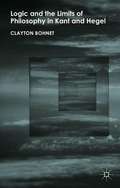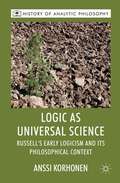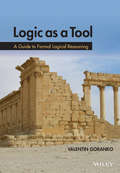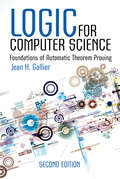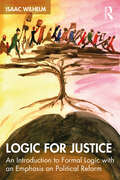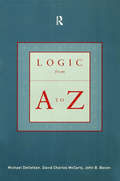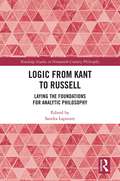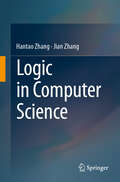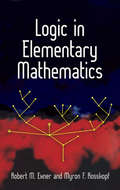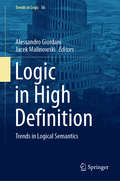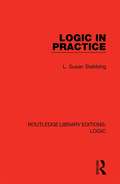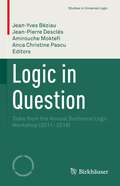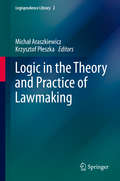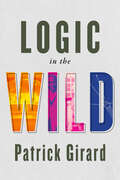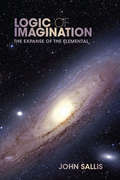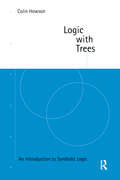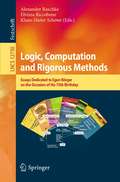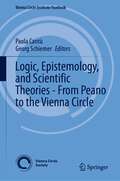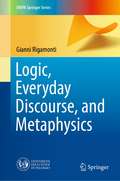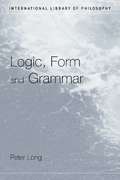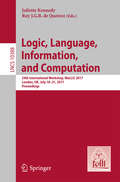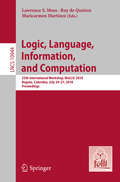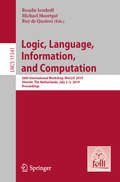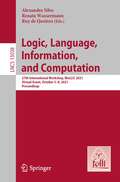- Table View
- List View
Logic and the Limits of Philosophy in Kant and Hegel
by Clayton BohnetThis text examines the boundary between philosophy and formal logic in Kant and Hegel. It takes up the particular category of 'quantity' as a point around which to explore Kant's and Hegel's larger architectonic concerns. Analysis of the relation in Kant between quantity in formal logic and in his transcendental logic reveals two complementary but distinct approaches that preserve the boundary between philosophy and formal logic. By contrast, in Hegel's Science of Logic we find both a novelapproach to the traditional treatment of quantity in logic, and a reconstruction of the relation of logic to all other determinations of thought. By basing its examination of the relation of formal logic and philosophy in Kant and Hegel on a detailed analysis of quantity, Logic and the Limits of Philosophy in Kant and Hegel provides a resource for an historically informed interpretation of the revolutions in logic that marked the onset of our digital age.
Logic as Universal Science
by Anssi KorhonenLogic as Universal Science offers a detailed reconstruction of the underlying philosophy in The Principles of Mathematics showing how Russell sought to deliver a death blow to the dominant Kantian view that formal logic is a concise and dry science and unable to enlarge our understanding.
Logic as a Tool: A Guide to Formal Logical Reasoning (Wiley Desktop Editions Ser.)
by Valentin GorankoWritten in a clear, precise and user-friendly style, Logic as a Tool: A Guide to Formal Logical Reasoning is intended for undergraduates in both mathematics and computer science, and will guide them to learn, understand and master the use of classical logic as a tool for doing correct reasoning. It offers a systematic and precise exposition of classical logic with many examples and exercises, and only the necessary minimum of theory. The book explains the grammar, semantics and use of classical logical languages and teaches the reader how grasp the meaning and translate them to and from natural language. It illustrates with extensive examples the use of the most popular deductive systems -- axiomatic systems, semantic tableaux, natural deduction, and resolution -- for formalising and automating logical reasoning both on propositional and on first-order level, and provides the reader with technical skills needed for practical derivations in them. Systematic guidelines are offered on how to perform logically correct and well-structured reasoning using these deductive systems and the reasoning techniques that they employ. •Concise and systematic exposition, with semi-formal but rigorous treatment of the minimum necessary theory, amply illustrated with examples •Emphasis both on conceptual understanding and on developing practical skills •Solid and balanced coverage of syntactic, semantic, and deductive aspects of logic •Includes extensive sets of exercises, many of them provided with solutions or answers•Supplemented by a website including detailed slides, additional exercises and solutionsFor more information browse the book's website at: https://logicasatool.wordpress.com
Logic for Computer Science: Foundations of Automatic Theorem Proving, Second Edition (Dover Books on Computer Science)
by Jean H. GallierThis advanced text for undergraduate and graduate students introduces mathematical logic with an emphasis on proof theory and procedures for algorithmic construction of formal proofs. The self-contained treatment is also useful for computer scientists and mathematically inclined readers interested in the formalization of proofs and basics of automatic theorem proving. Topics include propositional logic and its resolution, first-order logic, Gentzen's cut elimination theorem and applications, and Gentzen's sharpened Hauptsatz and Herbrand's theorem. Additional subjects include resolution in first-order logic; SLD-resolution, logic programming, and the foundations of PROLOG; and many-sorted first-order logic. Numerous problems appear throughout the book, and two Appendixes provide practical background information.
Logic for Justice: An Introduction to Formal Logic with an Emphasis on Political Reform
by Isaac WilhelmAn introductory textbook, Logic for Justice covers, in full detail, the language and semantics of both propositional logic and first-order logic. It motivates the study of those logical systems by drawing on social and political issues. Basically, Logic for Justice frames propositional logic and first-order logic as two theories of the distinction between good arguments and bad arguments. And the book explains why, for the purposes of social justice and political reform, we need theories of that distinction. In addition, Logic for Justice is extremely lucid, thorough, and clear. It explains, and motivates, many different features of the formalism of propositional logic and first-order logic, always connecting those features back to real-world issues. Key Features Connects the study of logic to real-world social and political issues, drawing in students who might not otherwise be attracted to the subject. Offers extremely clear and thorough presentations of technical material, allowing students to learn directly from the book without having to rely on instructor explanations. Carefully explains the value of arguing well throughout one’s life, with several discussions about how to argue and how arguments – when done with care – can be helpful personally. Includes examples that appear throughout the entire book, allowing students to see how the ideas presented in the book build on each other. Provides a large and diverse set of problems for each chapter. Teaches logic by connecting formal languages to natural languages with which students are already familiar, making it much easier for students to learn how logic works.
Logic from A to Z: The Routledge Encyclopedia of Philosophy Glossary of Logical and Mathematical Terms
by John B. Bacon Michael Detlefsen David Charles McCartyFirst published in the most ambitious international philosophy project for a generation; the Routledge Encyclopedia of Philosophy.Logic from A to Z is a unique glossary of terms used in formal logic and the philosophy of mathematics.Over 500 entries include key terms found in the study of:* Logic: Argument, Turing Machine, Variable* Set and model theory: Isomorphism, Function* Computability theory: Algorithm, Turing Machine* Plus a table of logical symbols.Extensively cross-referenced to help comprehension and add detail, Logic from A to Z provides an indispensable reference source for students of all branches of logic.
Logic from Kant to Russell: Laying the Foundations for Analytic Philosophy (Routledge Studies in Nineteenth-Century Philosophy)
by Sandra LapointeThe scope and method of logic as we know it today eminently reflect the ground-breaking developments of set theory and the logical foundations of mathematics at the turn of the 20th century. Unfortunately, little effort has been made to understand the idiosyncrasies of the philosophical context that led to these tremendous innovations in the 19thcentury beyond what is found in the works of mathematicians such as Frege, Hilbert, and Russell. This constitutes a monumental gap in our understanding of the central influences that shaped 19th-century thought, from Kant to Russell, and that helped to create the conditions in which analytic philosophy could emerge. The aim of Logic from Kant to Russell is to document the development of logic in the works of 19th-century philosophers. It contains thirteen original essays written by authors from a broad range of backgrounds—intellectual historians, historians of idealism, philosophers of science, and historians of logic and analytic philosophy. These essays question the standard narratives of analytic philosophy’s past and address concerns that are relevant to the contemporary philosophical study of language, mind, and cognition. The book covers a broad range of influential thinkers in 19th-century philosophy and analytic philosophy, including Kant, Bolzano, Hegel, Herbart, Lotze, the British Algebraists and Idealists, Moore, Russell, the Neo-Kantians, and Frege.
Logic in Computer Science
by Jian Zhang Hantao ZhangMathematical logic is an important basis for mathematics, computer science and artificial intelligence alike. This book provides a comprehensive introduction to various logics, including classical propositional logic and first-order predicate logic, as well as equational logic, temporal logic, and Hoare logic. In addition, it presents proof procedures for classical logics and decision procedures for checking the satisfiability of logical formulas. The book assumes no background in logic. It presents logics as practical tools for solving various problems in artificial intelligence and formal verification. Accordingly, it is well suited for (junior and senior) undergraduate and graduate students majoring in computer science or mathematics. Each chapter includes roughly a dozen exercise problems, so as to help the reader understand the concepts and techniques discussed.
Logic in Computer Science: Modelling and Reasoning about Systems
by Mark Ryan Michael HuthIn recent years, powerful tools for verifying hardware and software systems have been developed. Major companies, such as Intel, Siemens, BT, AT & T, and IBM have increasingly become interested in that technology. Students need a basic formal training that allows them to gain sufficient proficiency in using logic-based verification methods. This book addresses these needs by providing a sound basis in logic and an introduction to the logical frameworks used in modeling, specifying and verifying computer systems. Coverage provides a simple and clear presentation, detailing propositional and predicate logic as well as some specialized logics used for reasoning about the correctness of computer systems. The authors introduce a carefully chosen core of essential terminology; further technicalities are introduced only where they are required by the applications. Numerous examples are given, as well as a full exposition of a fast-growing technique for modeling and verifying computer systems, known as symbolic model checking. It will be an ideal introduction for undergraduate students. A worldwide web tutorial that supports the course activities and provides solutions to the sample exercises is available to instructors.
Logic in Elementary Mathematics (Dover Books on Mathematics)
by Robert M. Exner Myron F. RosskopfThis applications-related introductory treatment explores facets of modern symbolic logic useful in the exposition of elementary mathematics. The authors convey the material in a manner accessible to those trained in standard elementary mathematics but lacking any formal background in logic. Topics include the statement calculus, proof and demonstration, abstract mathematical systems, and the restricted predicate calculus. The final chapter draws upon the methods of logical reasoning covered in previous chapters to develop solutions of linear and quadratic equations, definitions of order and absolute value, and other applications. Numerous examples and exercises aid in the mastery of the language of logic.
Logic in High Definition: Trends in Logical Semantics (Trends in Logic #56)
by Jacek Malinowski Alessandro GiordaniThis volume clusters together issues centered upon the variety of types of intensional semantics. Consisting of 10 contributions, the volume is based on papers presented at the Trends in Logic 2019 conference. The various chapters introduce readers to the topic, or apply new types of logical semantics to elucidate subtleties of logical systems and natural language semantics.The book introduces hyperintentional systems that aim at solving some open philosophical problems. Specifically, the first three studies focus on relating semantics, while the following ones discuss fundamental issues related to hyper-intensional semantics or develop hyper-intensional frameworks to address issues in modal, epistemic, deontic and action logic. Authors in this volume present original results on logical systems but also extend beyond this by offering philosophical considerations on the topic as well. This volume will appeal to students and researchers in the field of logic.
Logic in Practice (Routledge Library Editions: Logic)
by L. Susan StebbingOriginally published in 1934. This fourth edition originally published 1954., revised by C. W. K. Mundle. "It must be the desire of every reasonable person to know how to justify a contention which is of sufficient importance to be seriously questioned. The explicit formulation of the principles of sound reasoning is the concern of Logic". This book discusses the habit of sound reasoning which is acquired by consciously attending to the logical principles of sound reasoning, in order to apply them to test the soundness of arguments. It isn’t an introduction to logic but it encourages the practice of logic, of deciding whether reasons in argument are sound or unsound. Stress is laid upon the importance of considering language, which is a key instrument of our thinking and is imperfect.
Logic in Question: Talks from the Annual Sorbonne Logic Workshop (2011- 2019) (Studies in Universal Logic)
by Jean-Yves Béziau Amirouche Moktefi Jean-Pierre Desclés Anca Christine PascuThis contributed volume collects papers related to the Logic in Question workshop, which has taken place annually at Sorbonne University in Paris since 2011. Each year, the workshop brings together historians, philosophers, mathematicians, linguists, and computer scientists to explore questions related to the nature of logic and how it has developed over the years. As a result, chapter authors provide a thorough, interdisciplinary exploration of topics that have been studied in the workshop. Organized into three sections, the first part of the book focuses on historical questions related to logic, the second explores philosophical questions, and the third section is dedicated to mathematical discussions. Specific topics include:• logic and analogy• Chinese logic• nineteenth century British logic (in particular Boole and Lewis Carroll)• logical diagrams • the place and value of logic in Louis Couturat’s philosophical thinking• contributions of logical analysis for mathematics education• the exceptionality of logic• the logical expressive power of natural languages• the unification of mathematics via topos theoryLogic in Question will appeal to pure logicians, historians of logic, philosophers, linguists, and other researchers interested in the history of logic, making this volume a unique and valuable contribution to the field.
Logic in the Theory and Practice of Lawmaking
by Michał Araszkiewicz Krzysztof PłeszkaThis book presents the current state of the art regarding the application of logical tools to the problems of theory and practice of lawmaking. It shows how contemporary logic may be useful in the analysis of legislation, legislative drafting and legal reasoning concerning different contexts of law making. Elaborations of the process of law making have variously emphasised its political, social or economic aspects. Yet despite strong interest in logical analyses of law, questions remains about the role of logical tools in law making. This volume attempts to bridge that gap, or at least to narrow it, drawing together some important research problems--and some possible solutions--as seen through the work of leading contemporary academics. The volume encompasses 20 chapters written by authors from 16 countries and it presents diversified views on the understanding of logic (from strict mathematical approaches to the informal, argumentative ones) and differentiated choices concerning the aspects of law making taken into account. The book presents a broad set of perspectives, insights and results into the emerging field of research devoted to the logical analysis of the area of creation of law. How does logic inform lawmaking? Are legal systems consistent and complete? How can legal rules be represented by means of formal calculi and visualization techniques? Does the structure of statutes or of legal systems resemble the structure of deductive systems? What are the logical relations between the basic concepts of jurisprudence that constitute the system of law? How are theories of legal interpretation relevant to the process of legislation? How might the statutory text be analysed by means of contemporary computer programs? These and other questions, ranging from the theoretical to the immediately practical, are addressed in this definitive collection.
Logic in the Wild
by Patrick GirardIs logic a good tool for making decisions? Can it make us better listeners and help us find coherence in views that we disagree with? Is Sherlock Holmes actually good at logic?Patrick Girard addresses these and other questions by presenting logic as the guardian of coherence. Logic, Girard argues, finds coherence in the patterns of reasoning across science, religion, and everyday decision making. It helps communities engage safely by replacing contentious debates with shared, constructive reasoning – logic provides neutral ground for the healthy pursuit of common goals and interests. Logic in the Wild employs common sense language, eschewing technical jargon, symbols, and equations. Girard’s attention focuses on logic’s power to find what unites the complex and the simple, the abstract and the concrete, the theoretical and the practical.In treating logic not as a passive subject to learn but as an active discipline to engage with, Logic in the Wild teaches us to identify patterns in our own reasoning, which inevitably helps us better confront questions central to everyday life.
Logic of Imagination
by John SallisThe Shakespearean image of a tempest and its aftermath forms the beginning as well as a major guiding thread of Logic of Imagination. Moving beyond the horizons of his earlier work, Force of Imagination, John Sallis sets out to unsettle the traditional conception of logic, to mark its limits, and, beyond these limits, to launch another, exorbitant logic--a logic of imagination. Drawing on a vast range of sources, including Plato, Aristotle, Kant, Hegel, Nietzsche, and Freud, as well as developments in modern logic and modern mathematics, Sallis shows how a logic of imagination can disclose the most elemental dimensions of nature and of human existence and how, through dialogue with contemporary astrophysics, it can reopen the project of a philosophical cosmology.
Logic with Trees: An Introduction to Symbolic Logic
by Colin HowsonFirst published in 1997. Routledge is an imprint of Taylor & Francis, an informa company.
Logic, Computation and Rigorous Methods: Essays Dedicated to Egon Börger on the Occasion of His 75th Birthday (Lecture Notes in Computer Science #12750)
by Klaus-Dieter Schewe Alexander Raschke Elvinia RiccobeneThis Festschrift was published in honor of Egon Börger on the occasion of his 75th birthday.It acknowledges Prof. Börger's inspiration as a scientist, author, mentor, and community organizer. Dedicated to a pioneer in the fields of logic and computer science, Egon Börger's research interests are unusual in scope, from programming languages to hardware architectures, software architectures, control systems, workflow and interaction patterns, business processes, web applications, and concurrent systems.The 18 invited contributions in this volume are by leading researchers in the areas of software engineering, programming languages, business information systems, and computer science logic.
Logic, Epistemology, and Scientific Theories - From Peano to the Vienna Circle (Vienna Circle Institute Yearbook #29)
by Georg Schiemer Paola CantùThis book provides a collection of chapters on the development of scientific philosophy and symbolic logic in the early twentieth century. The turn of the last century was a key transitional period for the development of symbolic logic and scientific philosophy. The Peano school, the editorial board of the Revue de Métaphysique et de Morale, and the members of the Vienna Circle are generally mentioned as champions of this transformation of the role of logic in mathematics and in the sciences. The scholarship contained provides a rich historical and philosophical understanding of these groups and research areas. Specifically, the contributions focus on a detailed investigation of the relation between structuralism and modern mathematics. In addition, this book provides a closer understanding of the relation between symbolic logic and previous traditions such as syllogistics. This volume also informs the reader on the relation between logic, the history and didactics in the Peano School. This edition appeals to students and researchers working in the history of philosophy and of logic, philosophy of science, as well as to researchers on the Vienna Circle and the Peano School.
Logic, Everyday Discourse, and Metaphysics (UNIPA Springer Series)
by Gianni RigamontiThis book applies the formal discipline of logic to everyday discourse. It offers a new analysis of the notion of individual, suggesting that this notion is linguistic, not ontological, and that anything denoted by a proper name in a well-functioning language game is an individual. It further posits that everyday discourse is non-compositional, i.e., its complex expressions are not just the result of putting simpler ones together but react on the latter, modifying their meaning through feedback. The book theorizes that in everyday discourse, there is no algebra of truth values, but the latter can be both input and output of something which has no truth value at all. It suggests that an elementary proposition of everyday discourse (defined as having exactly one predicate) can, in principle, be indefinitely expanded by adding new components, belonging neither to subject nor to predicate, but remain elementary. This book is of interest to logicians and philosophers of language.
Logic, Form and Grammar (International Library of Philosophy)
by Peter LongThis work contains Peter Long's important essay, Logic, Form and Grammar, which resolves many difficulties for the logical form of an argument where the reasoning is hypothetical. Also included are two essays on classical problems in philosophical logic, relating to logical form and formal relations. All of the essays provide clear thinking and philosophical explanations, overturning many unchallenged suggestions in philosophical logic.
Logic, Language, Information, and Computation
by Juliette Kennedy Ruy J. G. B. QueirozEdited in collaboration with FoLLI, the Association of Logic, Language and Information this book constitutes the refereed proceedings of the 21st Workshop on Logic, Language, Information and Communication, WoLLIC 2014, held in Valparaiso, Chile, in September 2014. The 15 contributed papers presented together with 6 invited lectures were carefully reviewed and selected from 29 submissions. The focus of the workshop was on the following subjects Inter-Disciplinary Research involving Formal Logic, Computing and Programming Theory, and Natural Language and Reasoning.
Logic, Language, Information, and Computation: 25th International Workshop, WoLLIC 2018, Bogota, Colombia, July 24-27, 2018, Proceedings (Lecture Notes in Computer Science #10944)
by Ruy De Queiroz Lawrence S. Moss Maricarmen MartinezEdited in collaboration with FoLLI, the Association of Logic, Language and Information this book constitutes the refereed proceedings of the 25th Workshop on Logic, Language, Information and Communication, WoLLIC 2018, held inBogota, Colombia, in July 2018. The 16 full papers together with 3 short papers and 3 invited talks presented were fully reviewed and selected from 30 submissions. The vision for the conference is to provide an annual forum which is large enough to provide meaningful interactions between logic and the sciences related to information and computation.
Logic, Language, Information, and Computation: 26th International Workshop, WoLLIC 2019, Utrecht, The Netherlands, July 2-5, 2019, Proceedings (Lecture Notes in Computer Science #11541)
by Ruy De Queiroz Rosalie Iemhoff Michael MoortgatEdited in collaboration with FoLLI, the Association of Logic, Language and Information this book constitutes the refereed proceedings of the 26th Workshop on Logic, Language, Information and Communication, WoLLIC 2019, held in Utrecht, The Netherlands, in July 2019. The 41 full papers together with 6 invited lectures presented were fully reviewed and selected from 60 submissions. The idea is to have a forum which is large enough in the number of possible interactions between logic and the sciences related to information and computation, and yet is small enough to allow for concrete and useful interaction among participants.
Logic, Language, Information, and Computation: 27th International Workshop, WoLLIC 2021, Virtual Event, October 5–8, 2021, Proceedings (Lecture Notes in Computer Science #13038)
by Ruy De Queiroz Alexandra Silva Renata WassermannEdited in collaboration with FoLLI, the Association of Logic, Language and Information this book constitutes the refereed proceedings of the 27th Workshop on Logic, Language, Information and Communication, WoLLIC 2021, Virtual Event, in October 2021. The 25 full papers presented included 6 invited lectures were fully reviewed and selected from 50 submissions.The idea is to have a forum which is large enough in the number of possible interactions between logic and the sciences related to information and computation.
